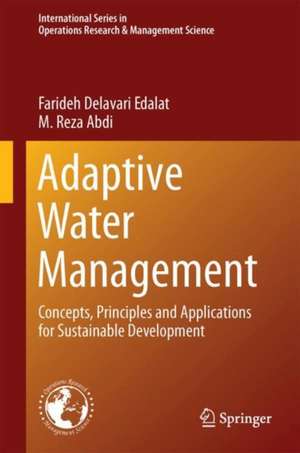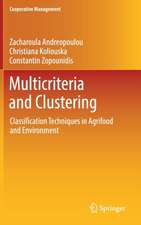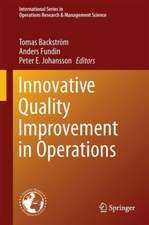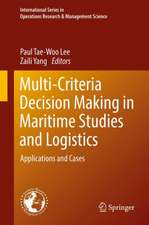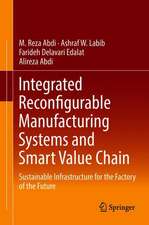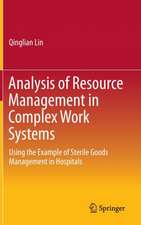Adaptive Water Management: Concepts, Principles and Applications for Sustainable Development: International Series in Operations Research & Management Science, cartea 258
Autor Farideh Delavari Edalat, M. Reza Abdien Limba Engleză Hardback – 19 sep 2017
The key characteristics of AWM i.e. polycentric governance, organisational flexibility and public participation are investigated and described through a critical review of the relevant literature. The book presents an empirical case study undertaken in a selected developing-country city to investigate the potential gaps between the current water management approaches and possible implementation of AWM. Feasibility of AWM operations is examined in an environment surrounded by established water management structure with centralised governance and an institutional process based on technical flexibility.
The key elements of AWM performance are (re)structured and transformed into decision support systems. Multi criteria decision models are developed to facilitate quantification and visualization of the elements derived from the case study, which is involved with water companies and water consumers. The book describes how the concept of AWM, along with structuring suitable decision support systems, can be developed and applied to developing-country cities. The book highlights the barriers for applying the AWM strategies that include established centralised decision making, bureaucratic interactions with external organisations, lack of organisational flexibility within the institutions, and lack of recognition of public role in water management. The findings outline that despite the lack of adaptability in the current water management in the case study, as an example of developing countries, there are positive attitudes among water professionals and the public towards adaptability through public-institutional participation.
| Toate formatele și edițiile | Preț | Express |
|---|---|---|
| Paperback (1) | 623.02 lei 38-45 zile | |
| Springer International Publishing – 22 aug 2018 | 623.02 lei 38-45 zile | |
| Hardback (1) | 715.05 lei 6-8 săpt. | |
| Springer International Publishing – 19 sep 2017 | 715.05 lei 6-8 săpt. |
Din seria International Series in Operations Research & Management Science
- 20%
 Preț: 325.71 lei
Preț: 325.71 lei - 23%
 Preț: 867.78 lei
Preț: 867.78 lei - 20%
 Preț: 570.61 lei
Preț: 570.61 lei - 18%
 Preț: 1112.91 lei
Preț: 1112.91 lei - 18%
 Preț: 760.67 lei
Preț: 760.67 lei -
 Preț: 201.22 lei
Preț: 201.22 lei -
 Preț: 170.39 lei
Preț: 170.39 lei - 17%
 Preț: 459.34 lei
Preț: 459.34 lei - 17%
 Preț: 360.47 lei
Preț: 360.47 lei -
 Preț: 282.24 lei
Preț: 282.24 lei - 24%
 Preț: 905.30 lei
Preț: 905.30 lei - 17%
 Preț: 460.08 lei
Preț: 460.08 lei - 17%
 Preț: 459.34 lei
Preț: 459.34 lei - 20%
 Preț: 631.58 lei
Preț: 631.58 lei - 18%
 Preț: 725.83 lei
Preț: 725.83 lei -
 Preț: 783.96 lei
Preț: 783.96 lei - 18%
 Preț: 1205.23 lei
Preț: 1205.23 lei - 18%
 Preț: 932.91 lei
Preț: 932.91 lei - 18%
 Preț: 692.01 lei
Preț: 692.01 lei - 18%
 Preț: 941.29 lei
Preț: 941.29 lei - 15%
 Preț: 640.86 lei
Preț: 640.86 lei - 20%
 Preț: 330.57 lei
Preț: 330.57 lei - 15%
 Preț: 630.23 lei
Preț: 630.23 lei -
 Preț: 397.53 lei
Preț: 397.53 lei - 18%
 Preț: 934.19 lei
Preț: 934.19 lei - 15%
 Preț: 638.14 lei
Preț: 638.14 lei - 18%
 Preț: 713.52 lei
Preț: 713.52 lei -
 Preț: 387.51 lei
Preț: 387.51 lei - 18%
 Preț: 935.41 lei
Preț: 935.41 lei - 15%
 Preț: 628.82 lei
Preț: 628.82 lei - 18%
 Preț: 760.04 lei
Preț: 760.04 lei - 18%
 Preț: 874.28 lei
Preț: 874.28 lei - 15%
 Preț: 644.56 lei
Preț: 644.56 lei - 15%
 Preț: 629.29 lei
Preț: 629.29 lei
Preț: 715.05 lei
Preț vechi: 872.01 lei
-18% Nou
Puncte Express: 1073
Preț estimativ în valută:
136.89€ • 142.29$ • 113.50£
136.89€ • 142.29$ • 113.50£
Carte tipărită la comandă
Livrare economică 07-21 februarie 25
Preluare comenzi: 021 569.72.76
Specificații
ISBN-13: 9783319641423
ISBN-10: 3319641425
Pagini: 164
Ilustrații: XVIII, 164 p. 35 illus., 26 illus. in color.
Dimensiuni: 155 x 235 mm
Greutate: 0.44 kg
Ediția:1st ed. 2018
Editura: Springer International Publishing
Colecția Springer
Seria International Series in Operations Research & Management Science
Locul publicării:Cham, Switzerland
ISBN-10: 3319641425
Pagini: 164
Ilustrații: XVIII, 164 p. 35 illus., 26 illus. in color.
Dimensiuni: 155 x 235 mm
Greutate: 0.44 kg
Ediția:1st ed. 2018
Editura: Springer International Publishing
Colecția Springer
Seria International Series in Operations Research & Management Science
Locul publicării:Cham, Switzerland
Cuprins
Chapter 1. Introduction.- Part 1. Concept and Application of Adaptive Water Management.- Chapter 2. Review of the main water management approaches over the last century.- Chapter 3. Conceptual Framework of Adaptive Water Management.- Part 2. Water management in Developing countries- an empirical study in the Middle East, Iran.- Chapter 4. Water management in developing countries: a case study of Iran.- Part 3. The Case Study- Background to Greater Tehran and Methods of Data Collection.- Chapter 5. The case study- background to Greater Tehran.- Chapter 6. The Case Study- Methods of Data Collection.- Part 4. Data Analysis Methodology- Evaluation of AWM framework.- Chapter 7. Data Analysis Methodology.- Chapter 8. Evaluation of polycentric governance.- Chapter 9. Evaluation of organisational flexibility.- Chapter 10. Evaluation of public participation.- Part 5. Conclusions and Recommendations.- Chapter 11. Review of the objectives regarding AWM adaptation.
Notă biografică
Farideh Delavari-Edalat has degrees including B.Sc. and M.Sc. and Ph.D., all related to the life sciences and environment management. She has over 15 years of experiences in industrial consultancy and academia through working in the areas related to the environment/water management. She received her Ph.D., in the area of adaptive environment management, focusing on aid to achieve a sustainable environment. She has published a number of papers in the areas of environment and water management in international peer reviewed journals and international conference proceedings. She has conducted various case studies and undertaken questionnaire designs, data collection including both quantitative and qualitative data using a variety of analytical methods and software packages for modelling and data analysis, and running behavioral experiments such as public water consumption behavior in developing countries and people attitude towards trees in urban areas in UK.
M. Reza Abdi has a background in manufacturing engineering and industrial management, and holds a PhD in manufacturing engineering from University of Manchester Institute of Science and Technology (UMIST), and an M.Phil in manufacturing engineering and Industrial management from Liverpool University. Reza has over 15 years of teaching and industrial experience in various universities and manufacturing companies. His specialist areas are operations management, manufacturing system design, decision support systems, analytical hierarchical process (AHP), analytical network process (ANP), information systems, environment management, computer modelling, systems dynamics, simulation and fuzzy logic. He has published various articles and five book chapters in the areas of operations and information management, and been a chair person and a member of program committees of a number of international conferences in the area of operations and information management, and environment management. He has been a principal member of the Course Approval and Review Team (CART) at Bradford University.
Textul de pe ultima copertă
This book explores a new framework of Adaptive Water Management (AWM) for evaluating existing approaches in urban water management. It highlights the need to adopt multidisciplinary strategies in water management while providing an in-depth understanding of institutional interactions amongst different water related sectors.
The key characteristics of AWM i.e. polycentric governance, organisational flexibility and public participation are investigated and described through a critical review of the relevant literature. The book presents an empirical case study undertaken in a selected developing-country city to investigate the potential gaps between the current water management approaches and possible implementation of AWM. Feasibility of AWM operations is examined in an environment surrounded by established water management structure with centralised governance and an institutional process based on technical flexibility.
The key elements of AWM performance are (re)structured and transformed into decision support systems. Multi criteria decision models are developed to facilitate quantification and visualization of the elements derived from the case study, which is involved with water companies and water consumers. The book describes how the concept of AWM, along with structuring suitable decision support systems, can be developed and applied to developing-country cities. The book highlights the barriers for applying the AWM strategies that include established centralised decision making, bureaucratic interactions with external organisations, lack of organisational flexibility within the institutions, and lack of recognition of public role in water management. The findings outline that despite the lack of adaptability in the current water management in the case study, as an example of developing countries, there are positive attitudes among water professionals and the public towards adaptability through public-institutional participation./p>
The key characteristics of AWM i.e. polycentric governance, organisational flexibility and public participation are investigated and described through a critical review of the relevant literature. The book presents an empirical case study undertaken in a selected developing-country city to investigate the potential gaps between the current water management approaches and possible implementation of AWM. Feasibility of AWM operations is examined in an environment surrounded by established water management structure with centralised governance and an institutional process based on technical flexibility.
The key elements of AWM performance are (re)structured and transformed into decision support systems. Multi criteria decision models are developed to facilitate quantification and visualization of the elements derived from the case study, which is involved with water companies and water consumers. The book describes how the concept of AWM, along with structuring suitable decision support systems, can be developed and applied to developing-country cities. The book highlights the barriers for applying the AWM strategies that include established centralised decision making, bureaucratic interactions with external organisations, lack of organisational flexibility within the institutions, and lack of recognition of public role in water management. The findings outline that despite the lack of adaptability in the current water management in the case study, as an example of developing countries, there are positive attitudes among water professionals and the public towards adaptability through public-institutional participation./p>
Caracteristici
Explains how selected decision support systems can be developed for improving water management Includes real case studies that reflect existing barriers and challenges for implementation of AWM in developing countries Considers whether it is possible for developing countries to implement AWM by moving from current water management practices such as WSM Includes supplementary material: sn.pub/extras
